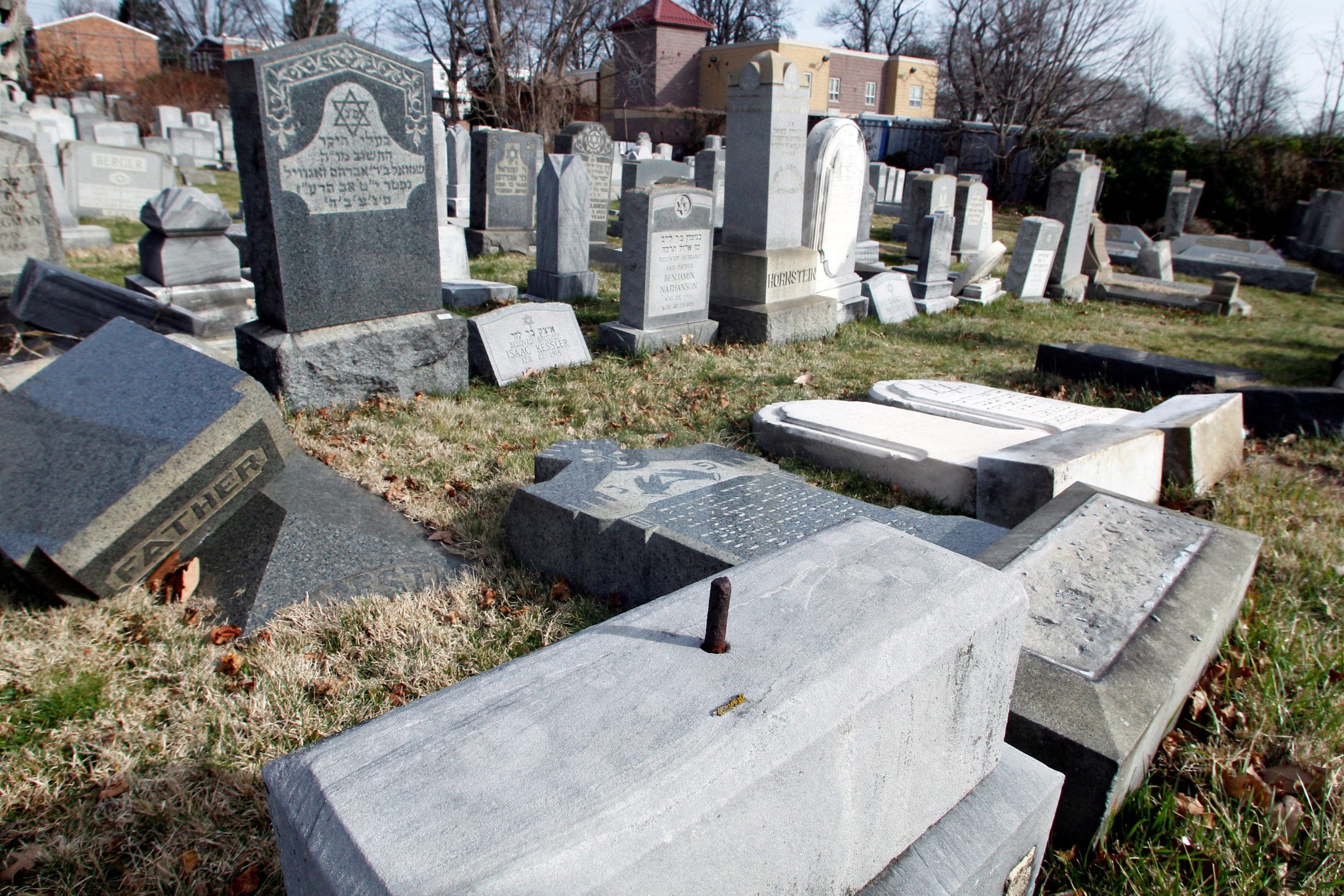 Headstones lay on the ground after vandals pushed them off their bases in the Mount Carmel Cemetery, a Jewish cemetery, in Philadelphia, Pennsylvania, U.S. February 27, 2017. REUTERS/Tom Mihalek
Headstones lay on the ground after vandals pushed them off their bases in the Mount Carmel Cemetery, a Jewish cemetery, in Philadelphia, Pennsylvania, U.S. February 27, 2017. REUTERS/Tom Mihalek 1.
Is there a wave of anti-Semitism in America? Last week I argued that it is complicated. This week, as the threats continue and the incidents keep piling up, it is becoming clearer that something is going on. Maybe – hopefully – a passing wave. Maybe – possibly – a self-fulfilled prophesy. Maybe – possibly – a wave that feeds itself. Maybe – possibly – a more sensitive Jewish American community reporting more vigorously every suspicious incident.
2.
We still haven’t seen suspects arrested for anti-Semitic behavior. This is, among other things, because of the nature of acts committed against Jews. Cowardly phone calls to JCCs and night raids on cemeteries are easy to commit and hard to catch. The result is that we don’t yet have much to say about the perpetrators. We don’t know anything about their motivations, about why the Jews, about why now. We don’t know if the perpetrators come from a certain group of people, or if maybe we are talking about an awakening of anti-Semitic sentiments among several groups.
Not that there’s any good excuse for anti-Semitic acts. Still, understanding the people whose actions rattle the Jews could be helpful and important. It could also feed, or refute, some of the allegations made against the Trump administration in lieu of recent attacks.
3.
Last week I asked here – backed by numbers – “Have we (Jews) been wrong to assume – as a group – that anti-Semitism is in decline? Have we – as a group – showed a misguided tendency to ignore the reality around us?”
The question lingers.
4.
The other day, Israel’s Labor Party leader Isaac Herzog argued that Israel ought to prepare for a massive immigration of Jews from the US. He was rightly mocked for this trigger-happy alarmism. US Jews are not packing, and are less likely to come en-masse than Herzog assumes (we are still waiting for the expected, but never materialized wave of French immigrants). In fact, as Moshe Arens told me last week, this lack of enthusiasm for Aliyah can serve as proof that the anti-Semitic wave is not as threatening as our response seems to suggest.
Still, thinking about Herzog’s early prediction, one wonders: Many of the US Jews immigrating to Israel are Orthodox Jews. Many of the Jews who cannot hide from anti-Semitism because of their high visibility – those wearing special clothes, walking around with a Kippah, going to synagogue more frequently – are Orthodox. That is to say: Orthodox Jews in America might be more inclined to consider Aliyah and might have more reason to consider Aliyah.
Let’s change the question then: Are we about to see an intensification of Orthodox Jewish American Aliyah to Israel? (If the answer is yes, the Labor Party might not be the main beneficiary of such a trend, politically speaking.)
5.
Jews respond to anti-Semitism in various ways.
Some prefer to disappear, to lower their Jewish profile, so as not to put themselves under risk.
Some prefer to strengthen their Jewish ties and to become more active and more proudly, even defiantly, Jewish.
Some prefer to come together as Jews, while others search for alliances with other minority groups.
Some do not let anti-Semitism – when it is at the current level – become a disruption in their lives. But some obsess about the rise of anti-Semitism and feel that the skies are about to fall.
Some have the self-satisfaction of “I told you so.” Others are shocked: they never suspected that anti-Semitism is still a real thing.
Some are looking for specific culprits – President Trump, Israel’s hawkish government, the BDS movement, radical Islam – while others believe anti-Semitism is a constant feature of society and isn’t worthy of too much specific parsing.
6.
The responses listed above are personal responses. But they could also be the joint responses of certain groups of Jews. If the wave of anti-Semitism continues, expect studies of American Jewry to change accordingly. Rather than asking which Jews are more connected to Israel, more likely to light a Menorah, more likely to say that they want their children to be Jewish, less likely to have a Jewish spouse – we will ask which Jews prefer to lower their Jewish profile, and which prefer to defiantly strengthen their Jewish ties.
Look at the synagogue in your neighborhood: is it becoming more crowded, or unusually empty?
Look at Jewish day school registration numbers: are more parents deciding that it is safer to avoid such schools – or do more parents feel that now is the time to insist on a more thorough Jewish education?
Look at how young students behave on campus: do they have a growing tendency to forget to mention that they are Jewish, or are they congregating in Hillels more than in the past?
The answers to all of these questions will often be predictable: the stronger one’s Jewish identity, the lower the chance that he or she will hide. But sometimes they can be unpredictable: anti-Semitism has a strange ability to motivate Jews and make them defiant. We are, after all, a stiff-necked people.
7.
To be clear: I do not intend to judge any of the above-listed responses. Israelis like me should be careful not to judge diaspora Jews for their response to a problem from which we Israelis do not suffer.























 More news and opinions than at a Shabbat dinner, right in your inbox.
More news and opinions than at a Shabbat dinner, right in your inbox.